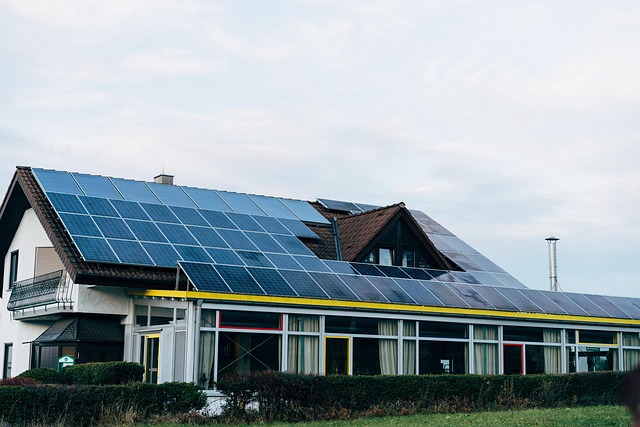EXPLORING THE ALLURE OF ECO-CONSCIOUS PREFABRICATED BUNGALOWS
In the UK, the trend of combining luxury with sustainability is on the rise as prefabricated bungalows equipped with solar panels become the homes of choice for eco-conscious buyers. These modern, energy-efficient homes offer an appealing blend of style and functionality, providing a sustainable living solution that aligns with the growing demand for renewable energy and environmentally friendly housing.

What are prefabricated bungalows and why are they gaining popularity?
Prefabricated bungalows are single-story homes that are manufactured off-site in controlled factory environments and then transported to their final location for assembly. This construction method offers several advantages, including reduced build time, consistent quality, and minimal on-site waste. The appeal of these homes lies in their customizability, energy efficiency, and cost-effectiveness. In recent years, their popularity has surged as more people seek sustainable living solutions that don’t compromise on comfort or style.
How do solar panels contribute to sustainable living in these homes?
The integration of solar panels in prefabricated bungalows plays a crucial role in their sustainability credentials. These photovoltaic systems harness the sun’s energy to generate electricity, significantly reducing reliance on the grid and lowering carbon emissions. In the UK, where renewable energy adoption is on the rise, solar-equipped homes offer residents the opportunity to reduce their energy bills and carbon footprint simultaneously. The seamless incorporation of solar technology into the design of these bungalows demonstrates how modern construction can prioritize both aesthetics and environmental responsibility.
What design features make prefabricated bungalows both luxurious and sustainable?
Prefabricated bungalows are shedding the outdated perception of modular homes as basic or utilitarian. Today’s designs incorporate high-end finishes, open-plan layouts, and large windows that create a sense of spaciousness and connection with the outdoors. Sustainable materials such as recycled steel, responsibly sourced timber, and low-VOC paints are commonly used. Energy-efficient appliances, smart home systems, and superior insulation further enhance the luxury and eco-friendliness of these dwellings. The result is a home that feels both indulgent and environmentally responsible.
How does the functionality of prefab bungalows compare to traditional homes?
The functionality of prefabricated bungalows often surpasses that of traditional homes. Their single-story design eliminates the need for stairs, making them ideal for accessibility and aging in place. The factory-controlled assembly ensures tight seals and precise construction, leading to better energy performance. Many prefab bungalows are designed with flexible spaces that can adapt to changing needs, such as home offices or guest rooms. Additionally, the reduced maintenance requirements and potential for easy future upgrades make these homes a practical choice for modern living.
What unique benefits do prefabricated bungalows offer in the UK housing market?
In the UK, where housing shortages and sustainability concerns are pressing issues, prefabricated bungalows offer unique advantages. These homes can be constructed and installed much faster than traditional builds, helping to address housing demand more quickly. Their energy efficiency aligns with the UK’s goals for reducing carbon emissions in the residential sector. For rural areas or locations with limited building space, prefab bungalows provide a solution that minimizes disruption to the local environment during construction. Moreover, their adaptability makes them suitable for a wide range of demographics, from young professionals to retirees.
What are the future trends in eco-friendly prefabricated housing?
The future of eco-friendly prefabricated housing looks promising, with several exciting trends on the horizon. We can expect to see increased use of AI and IoT technologies to optimize energy use and home management. Advancements in energy storage systems will likely complement solar panels, allowing for greater energy independence. Biophilic design principles, which incorporate nature into living spaces, are likely to become more prevalent. Additionally, the use of 3D printing in prefab construction could revolutionize the customization and sustainability of these homes. As climate change concerns intensify, we may also see a rise in resilient design features that help these homes withstand extreme weather events.
| Provider | Services Offered | Key Features/Benefits |
|---|---|---|
| Huf Haus | Custom prefab homes | German engineering, energy-efficient glass houses |
| Baufritz | Eco-friendly prefab homes | Organic building materials, customizable designs |
| WeberHaus | Turnkey prefab solutions | Smart home technology, high energy efficiency standards |
| Stommel Haus | Timber-frame prefabs | Passivhaus designs, sustainable Scottish timber |
| Danwood | Affordable prefab options | Quick build times, wide range of models |
In conclusion, eco-conscious prefabricated bungalows represent a significant step forward in sustainable housing. By combining luxury with environmental responsibility, these homes are setting new standards for modern living in the UK. As technology advances and environmental awareness grows, we can expect these innovative dwellings to play an increasingly important role in shaping the future of residential architecture and sustainable living practices.




